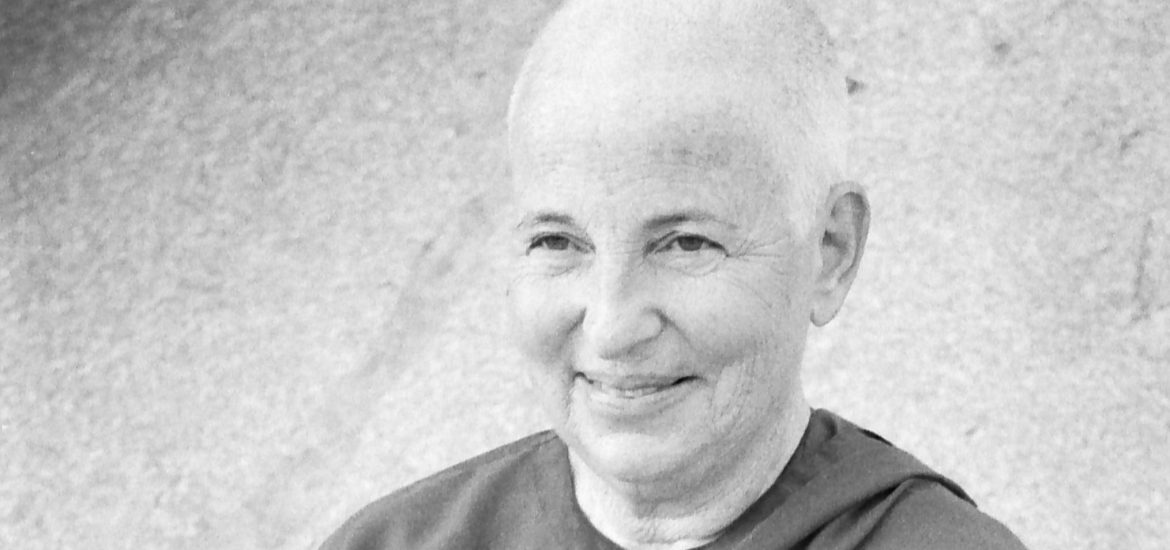When Ayya Tathaloka asked me whether I would be interested to write a brief tribute to Ayya Khema (1923–97), whose anniversary is today on 25 August, I was reminded of my earliest days as a freelance editor of Buddhistdoor Global, when I came across a collection of old recordings given by this seminal bhikkhuni. These archived Dhamma talks date back to the 1990s, in the last decade of Ayya Khema’s life. They are still online on the old version of our website, and one talk I sampled (it is now on SoundCloud) was about the four kinds of happiness.
Listening to her voice, her compassion embodied in her warm and careful words, is an uplifting and stirring experience. She was also a prolific writer, having authored over a dozen books in German and English. As Ayya Tathaloka said about Ayya Khema, “She was really in the vanguard, not only with bhikkhuni ordination and with the Sakyadhita organization, but also with the international spread of mindfulness and Vipassana teachings, especially in US, Germany, and Australia.” She also noted that several local and global celebrations and commemorative events have taken place over this month.
Sakyadhita owes a particular debt to Ayya Khema for having coordinated the first international conference of Buddhist nuns in 1987, with His Holiness the Dalai Lama as a keynote speaker. This would result in the formation of Sakyadhita. In the same year, she was the first ordained Buddhist to address the United Nations headquarters in New York.
Even if one leaves aside the fact that Ayya Khema played an instrumental role in so many institutions for Buddhist women (she founded Wat Buddha Dhamma, a Theravada forest monastery near Sydney in 1978), she lived a life that was easily more interesting and dramatic than most. She born as Ilse Kussel in Berlin, to Jewish parents in 1923. Hitler’s rise to power and the Nazi takeover forced her to flee in 1938. She was brought to Scotland, while her parents headed to China. Remarkably, she was able to reunite with them relatively quickly after two years in Shanghai. But they could not escape the Axis sweep, and in 1944, even as Japan and Germany were losing, the Kussel family was forced into a Japanese camp, where her father passed away.
Before she became a deeply educated and thoroughly-practiced nun, Ayya Khema accumulated many life experiences that made her a well-rounded woman. At 22, she married her first husband and they lived in what is today’s Hongkou district in Shanghai. In 1949, she and her husband left for the US, where she would later divorce her husband and marry another man. Between 1960 and 1964 she traveled with her family throughout the world, and would eventually take refuge in the three treasures and become a female novice in 1979, under Narada Maha Thera. So began her monastic journey, from teaching meditation, starting in 1983, to her full bhikkhuni ordination under Fo Guang Shan at Hsi Lai Temple.
This anniversary has also reminded one of how we are seen impermanence in action. Several senior female teachers of the Dharma have passed away in recent years, including Ayya Mie Vimala this year, and Ajahn Vayama and Dr. Bhikkhuni Kusama in 2021. Nevertheless, the difference she made can be seen in how bhikkhuni numbers grow from strength to strength. The number of female Theravada monastics has been steadily growing in all countries in which they exist. In 2021, they exceed 5,550 worldwide, with many more ordinations starting to happen post-COVID.
To honor Ayya Khema’s legacy, it is not necessary to insist that more women ordain. Rather, the priority would seem to be the strengthening of (and founding more) institutions that support Buddhist women. It is one thing to join the sangha. But whether one has the resources and support to sustain a sangha-oriented lifestyle until death, like Ayya Khema, seems like a more important priority. As Ayya Tathaloka said, “Ayya Khema herself was outstanding and exceptional. She herself donated enormously and gave extremely generously; and also due to her outstanding merits (talents and abilities), she was supported far better than what is the average for Buddhist women in the West, even today.”
See more
I Give You My Life (Shambhala)
Ayya Khema (Buddhistdoor Audio Channel)
Related news from BDG
Ajahn Vayama, Pioneering Australian Buddhist Nun, Dies Aged 70
Pioneering Female Buddhist Monastic Ven. Dr. Bhikkhuni Kusuma Dies Aged 92
Related blog posts from BDG
The Passing of a Generation: In Memory of Ven. Ayyā Mie Vimalā of Königsberg


